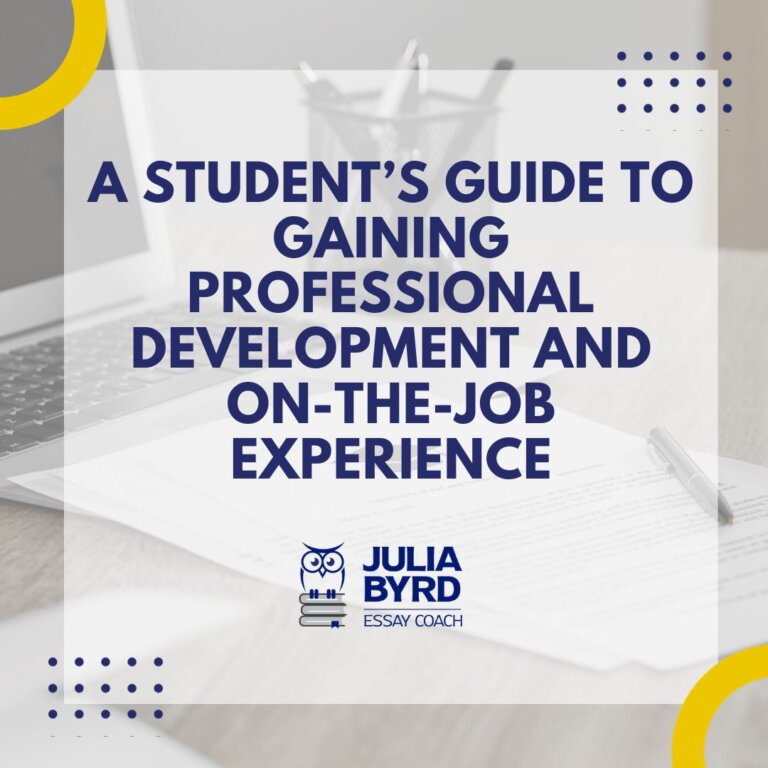32 Things Admission Officers Want You to Know About College Essays


The admissions process is stressful under the best of circumstances. In today’s uncertain environment, it’s even more so. So when you’re writing your admissions essays, wouldn’t you love a tried-and-true formula to follow? Or maybe get a sneak peek inside the brain of an admissions officer to find out just what they’re looking for in your essay?
While I can’t help you with the former, I can offer a little insight into the latter.
Julie Simons of Helios College Counseling recently hosted the “Great Personal Essays: How to Tell Your Story to Get in” webinar and got the inside scoop on essays from admissions professionals from several colleges and universities and found out what admission officers want you to know.
Here are 32 important pieces of information I came away with:
The Role of the Essay
- Because admissions officers can’t interview every student in person, the essay is your opportunity to introduce yourself to them, tell them something they won’t find out about you elsewhere in your application, and share who you are as a student.
- Colleges use their supplemental essays to get to know you even better and to make sure you know exactly why you want to go to their school above all others.
The Impact of the Essay
- Essays have varying weights, depending on the school. Sometimes, the essay can be the difference between getting into an honors program and not.
- But one thing is true: If your grades and academic profile aren’t strong enough, an essay won’t be enough to overcome that and earn an acceptance.
- You’d have to write a really bad essay for some schools to change their mind about accepting you — but this approach differs from school to school (especially with more selective schools).
Essay Structure
- Admission officers want you to know that you can write the essay you want to write. That means writing the essay that best explains you and shows your passions. Don’t write the essay you think the admission counselor wants you to write.
- Because you have a limited word count, get right to the point in your introduction. Instead of a three-paragraph introduction, get it down to one.
- If you’re going to use a different language anywhere in your essay (like in a short quote), make sure you translate what was said for a reader who doesn’t speak the language.
- Make sure your essay is cohesive and well-thought-out. Consider outlining the essay first to make sure it flows and doesn’t jump around.
- Use description to capture the reader’s attention.
- Don’t be afraid to be humorous and clever in your essay.
- Be specific when you can. Instead of speaking very broadly about a potential career path, be specific about what you’d like to do.
- Don’t try to be something (or someone) you’re not.
- Don’t feel the pressure to show that you’ve overcome an obstacle, especially if it doesn’t flow with the rest of the essay.
- Use the fewest words needed to communicate your point effectively , but you can absolutely use all your 650 words.
Topics and Prompts
- While it doesn’t matter which prompt you choose, ensure your essay does address that prompt.
- There are some topics you want to avoid writing (e.g., violence, self-harm, negative racial undertones). And if you do share them, remember there can be consequences.
- Admissions officers enjoy hearing about a student’s roots — how students connect with their background and heritage.
- You don’t have to have an incredibly meaningful topic. Admissions officers want to get to know you, your quirks and sense of humor, and your views on the world so they can see what you’ll be like as a student on their campus.
- On a scale of 1-10 (where 1 is a recitation of activities and 10 is the most out-of-the-box topic), admissions are looking for essay topics that rank around a 7-8.
Proofreading
- Grammar and punctuation matter to admissions officers more than you might think. Don’t forget to proofread!
- Proofreading is more than running spell-check. Make sure you read each essay to each school word-for-word before you submit.
Reviews by Admission Officers
- Admission officers want you to know they can identify voice. They want to read an essay that “sounded like a 17-year-old wrote it.”
- The less work you make an admissions counselor do when trying to understand your essay, the more they’ll appreciate you.
- You never know what topic will end up connecting — or not connecting — with a reader. But luckily, admissions officers are trained to read an essay from the perspective of getting a better understanding of who the student is — even if they don’t connect with the topic.
- Each essay will be read at least once by admissions officers — even for schools like the University of Maryland, which receives about 53,000 applications (and essays) each year. Some schools will read each essay up to three times.
- Admissions officers admit they’ll probably spend only 5 minutes (tops) reviewing a student’s essay.
- Sometimes, they won’t even read the whole essay. They’ll stop halfway through if they don’t enjoy it or aren’t hooked by your opening, or they may just read the first sentences of each of the paragraphs.
- A bad essay isn’t going to tank your application, as long as everything else in your application is solid.
- Admissions officers are looking for you to be human in your essay. They want you to offer new information about who you are, what you hope to do and what you’re capable of doing.
- If you’re excited to write your essay, that will come across in your finished product. If it feels like an assignment, that will come across, too.
- Admissions officers are looking for reasons to admit you — make your essay a reason for them to admit you.
If you’re looking to find a standout topic for your college admissions essay or want to learn more about what admissions officers are looking for in an essay, contact me. I’d love to tell you more.









